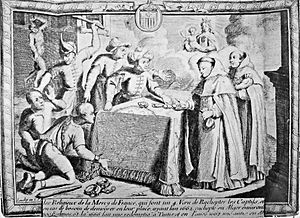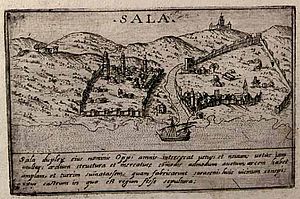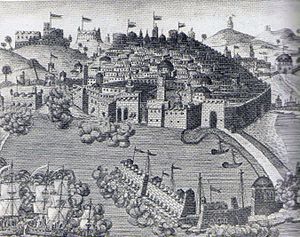Anglo-Turkish piracy facts for kids

Anglo-Turkish piracy was a time in the 1600s when English pirates worked together with Barbary pirates. They teamed up to attack ships belonging to Catholic countries. This was often called Anglo-Barbary piracy.
Why English and Turkish Pirates Teamed Up
During the 1600s, Protestants (like many English people) and Muslims (like the Turks from the Barbary Coast) had a common goal. They both had big disagreements with Catholic Europe. Countries like Spain, Portugal, and France were Catholic and often had strict rules against Protestants. This made them a target for this unusual team-up.
Before 1604, English privateers (sailors hired by their government to attack enemy ships) often fought against Spain. When England made peace with Spain in 1604, many of these privateers lost their jobs. King James I officially stopped privateering in 1603.
Joining the Muslim pirates in the Barbary States was a way for these English sailors to find new work. It also offered a chance to get rich by attacking Catholic ships. By 1610, the stories of wealthy English renegade pirates (people who had changed their loyalty or religion) were so famous that plays were written about them. The king even offered a Royal Pardon to those who wanted to come back home.
It wasn't just English pirates involved; Dutch pirates also joined this collaboration. They shared similar goals. When Catholic ships were attacked, the sailors and passengers were often taken to places like Algiers (in modern-day Algeria) or other parts of the Barbary Coast. There, they were sold as slaves.
Many English pirates became famous for this. Some well-known names included Jack Ward, Henry Mainwaring, Robert Walsingham, and Peter Easton. They worked for the Barbary rulers, called deys. Famous Dutch pirates included Zymen Danseker, Salomo de Veenboer, and Jan Janszoon. Some, like Ward and Danseker, even became Muslims. Walsingham was known for freeing Turkish captives from Christian galleys (ships powered by oars) and selling Christian captives in North Africa. Janszoon led raids far away, like the Turkish Abductions in Iceland, to capture people and sell them on the Barbary Coast.
One English writer at the time complained:
"The huge amount of goods, jewels, and treasure taken by our English pirates daily from Christians and carried to Allarach, Algire, and Tunis greatly enriches the Moors and Turks and makes Christians poorer."
Besides shared religious disagreements, the Barbary States offered good opportunities for Protestant pirates. They could make money and even gain a higher social standing. The Barbary States were very diverse places back then.
How Catholic Countries Reacted
France had a long history of alliances with the Ottoman Empire. In 1607, France officially complained to the Ottoman Sultan Ahmed I. They said that English and Dutch pirates were using North African ports to attack French ships. France saw this as a clear plot against Catholicism, calling it "Turco-Calvinism" (meaning a mix of Turkish and Protestant beliefs).
To stop these attacks, Spain made a public statement against piracy in 1615.
England itself started to have mixed feelings about this piracy. In 1621, England even attacked Algiers to free Christian captives held there. In 1629, King Louis XIII of France attacked Salé to free 420 French prisoners. Later, King Louis XIV also bombed Algiers to get revenge.
Catholic religious groups, especially the Trinitarians and the Lazarists (led by Saint Vincent de Paul, who was once a slave himself), worked hard to help. They collected money to buy back and free Christian slaves. It's thought that these missionaries freed about 1,200 slaves by the time Saint Vincent de Paul died in 1660. This cost a huge amount of money, about 1,200,000 livres (an old French currency).
See Also
- Islam and Protestantism
- Barbary Slave Trade
- Luis Fajardo
- Sea Beggars
 | Frances Mary Albrier |
 | Whitney Young |
 | Muhammad Ali |



